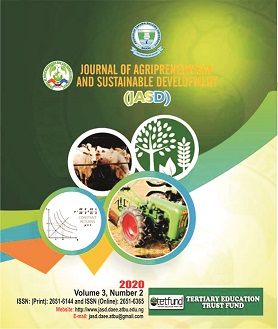PHYSICAL AND CHEMICAL PROPERTIES OF SOIL INFLUENCED BY PARAQUAT HERBICIDE APPLICATION IN GWAGWALADA AREA COUNCIL, ABUJA, NIGERIA
DOI:
https://doi.org/10.59331/jasd.v3i2.116Keywords:
Application, Herbicide, Paraquat, Physico-chemical Properties, Soil, TreatmentAbstract
The study was conducted with the purpose of determining the effects of herbicide (paraquat) on some important physico-chemical properties of soils of University of Abuja Teaching and Research Farmland. A portion of land in the school farm was mapped out for this experiment. Samples of soil from the land were collected for analysis in which the physico-chemical properties of soil were determined. Thereafter, the field was laid out using RCBD (Randomized Complete Block Design) which had four treatments with three replicates. The four (4) treatments used were 0ml/L which involves no paraquat application and called the control. The second treatment was 5ml/L which involved the use of 5ml/L of paraquat. The third treatment was 15ml/L, in which 15ml/L of paraquat was applied. The fourth treatment used was 30ml/L, which involved the application of 30ml/L of paraquat. From the result of the soil analysis, the soil’s textural class was sandy loam. The soil was acidic with a pH of 5.2 and has an average electrical conductivity of 0.060mg/kg. Its content of organic matter, organic carbon and total nitrogen was 0.87 mg/kg, 1.08mg/kg and 0.175mg/kg respectively. Cation Exchange Capacity of the soil was low with the value 8.60cmol/kg and Effective Cation Exchange Capacity of 8.12cmol/kg. The soil was high in micro-nutrients (iron-Fe, manganese-Mn, zinc-Zn and copper-Cu). The result of the experiment showed that paraquat does not have negative effect on the properties of the soil and therefore is reliable for use within this ecological zone.
Downloads

Downloads
Published
How to Cite
Issue
Section
License
Copyright (c) 2022 Journal of Agripreneurship and Sustainable Development

This work is licensed under a Creative Commons Attribution 4.0 International License.






